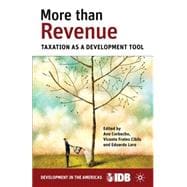
Note: Supplemental materials are not guaranteed with Rental or Used book purchases.
Purchase Benefits
What is included with this book?
The IDB is an international institution created in 1959 to foster economic and social development in Latin America and the Caribbean. It is the main source of multilateral financing and expertise for sustainable economic, social, and institutional development in Latin America and the Caribbean.
Ana Corbacho is the Sector Economic Advisor for the Institutions in Development Sector at the IDB. Previously, she was at the IMF where she began as a desk economist for Bulgaria and a fiscal economist for Honduras. She quickly rose through the Fiscal Affairs Department and was eventually named Deputy Division Chief of the Western Hemisphere Department. Her areas of expertise include macroeconomic and fiscal policy analysis, fiscal institutions and public infrastructure financing, and household survey analysis, poverty, and income distribution. She holds a Ph.D. in Economics and a master of philosophy from Columbia University and a licentiate in Economics from the Universidad de San Andres. She has received numerous honors and fellowships including merit scholarships as the Columbia President's Fellow, Public Policy Consortium Fellow, Bradley Foundation Fellow, and Organization of American States Fellow. Vicente Fretes Cibils joined the IDB in 2007 and is currently a Division Chief of Fiscal and Municipal Management in the Sector of Institutions for Development. Previously, he worked at the World Bank. Following stints in the Office of the Vice President for Europe and the Middle East and its Treasury Department, he served from 1988 to 1992 as Economist in the Office of the Vice President for West Africa Operations. From 1992 to 1996, he served as Chief Economist in the Department of Operations for Andean Countries, supervising adjustment programs and heading up economic analytical missions to Bolivia. From 1996 to 2002, he served as Senior Economist for the República Bolivariana de Venezuela, and subsequently for Colombia and Mexico. From 2002 to 2007 he was Lead Economist in the Poverty Reduction and Economic Management sector for the Andean Countries Department. He has also taught at Argentina's Universidad Nacional del Nordeste and at North Carolina State University, and has published numerous works addressing topics in finance, applied econometrics, public finance, international economics, and economic development. He completed his undergraduate work at the Universidad Nacional del Nordeste in Argentina and pursued postgraduate studies at the University of Pennsylvania and North Carolina State University, where he received, respectively, a master's degree in business administration and a PhD in economics. Eduardo Lora served as Chief Economist and Manager of the IDB's Research Department from 2008 to 2012 and as Senior Economist and Principal Advisor from 1996 to 2008. Previously, he was executive director of Fedesarrollo, the leading economic think-tank in Colombia. He is also editor of Vox.Lacea, an elected member of the executive board of Lacea, and a regular columnist for Dinero magazine in Colombia. He has been the author or editor of over 30 books, 5 textbooks, and 5 issues of the flagship publication of the IDB. He holds an undergraduate degree in Economics from the Universidad Nacional de Colombia and a Master of Science degree in Economics from the LSE. He has received various academic and professional awards, including the title of 'Distinguished Alumnus' of the LSE and the Simón Bolivar Fellowship of the British Council.
The New copy of this book will include any supplemental materials advertised. Please check the title of the book to determine if it should include any access cards, study guides, lab manuals, CDs, etc.
The Used, Rental and eBook copies of this book are not guaranteed to include any supplemental materials. Typically, only the book itself is included. This is true even if the title states it includes any access cards, study guides, lab manuals, CDs, etc.